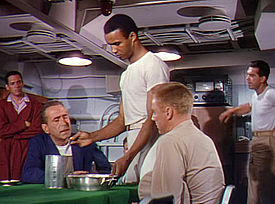Because I'm a punctilious kind of guy, I want to paraphrase the legal analysis of Marty Lederman on why Trump can't fire Mueller, despite the statements of Trump's Press Secretary. Let's start with the caveat, because this may, or may not, be unsettled law, and I've done no legal research myself about it:
“I was surprised to hear it with what Sarah Sanders said,” Napolitano explained. “Right after the clip you ran, she said ‘we’ve been advised we can.’ Translate, they asked for a legal opinion from the Justice Department and from outside lawyers — we now know this — about whether the president can fire Bob Mueller and they got arguments on both sides, but the arguments came down on the side of ‘yes, he can do so.'”Lederer would argue there is no "good law" saying Trump can fire Mueller, based on a legal doctrine recognized in this country as early as 1789 and showing up in the case law as early as 1839. The doctrine is that “as a constitutional principle the power of appointment carrie[s] with it the power of removal”—a “rule of constitutional and statutory construction” that was “then generally conceded, [and] has been recognized ever since.” The quotes there are from a 1926 Supreme Court opinion. To cut to the chase, as Lederer points out, it is because of this doctrine that Nixon had to have a Saturday Night Massacre. He couldn't fire Archibald Cox outright, any more than he could fire Leon Jaworski after Cox. Lederer also quotes a 2010 Supreme Court opinion citing that 1926 case and the 1839 case applying that constitutional principle in the 21st century. I'd say that's pretty settled law, myself.
“Now it’s unsettled law, meaning there’s good law saying he can’t and there’s good law saying he can,” he noted.
To start down that road Trump would have to fire Rosenstein, and maybe even Sessions, and then find his Bork, a DAG willing to take the mantle of Acting AG whose first job was to fire Mueller. Oh, and that person would have to be someone confirmed to office by the Senate. (Bork was Solicitor-General under Nixon). The last underling standing in the DOJ would not be sufficient to the task. Lederer sets up how that would go down very nicely, with a simple factual reminder at the end of the conjectural musings:
I am very doubtful Trump would be able to find anyone eligible to be AG or DAG who would be willing to do that dirty work—especially not after a removal of Sessions and/or Rosenstein and the political outrage and tumult that would inevitably follow in its wake. But make no mistake: That is what would be required. And even then, the investigation would only revert to the authority of FBI Director Christopher Wray, who would be likely to take up Mueller’s mantle and continue his investigation vigorously. Which is another reason why we’re unlikely to see Trump try to effect Mueller’s removal.
Yup. Firing Mueller doesn't end the investigation. Trump would have to fire Wray to do that, and anyone who took Wray's place and continued the investigation. At that point even the GOP wouldn't defend him; or the few who did wouldn't last the hurricane coming in November.
The House Judiciary Committee “just might pull the trigger if the President fires Mueller,” Rep. X supposedly said. “The sh*t will hit the fan if that happens and I’d vote to impeach him myself. Most of us would, I think. Hell, all the Democrats would and you only need a majority in the House. If we’re going to lose because of him, we might as well impeach the motherf**ker. Take him out with us and let Mike [Pence] take over. At least then we could sleep well at night.”
“I say a lot of shit on TV defending him, even over this,” Rep. X tells Erickson. Erickson describes the Congressman as someone who defends Trump on Fox News and in public but obviously has a different personal opinion. The media and Democrats on Capitol Hill often say many Republican lawmakers oppose Trump in private, but won’t in public. (There are several words for that.)
“But honestly, I wish the motherf*cker would just go away. We’re going to lose the House, lose the Senate, and lose a bunch of states because of him. All his supporters will blame us for what we have or have not done, but he hasn’t led. He wakes up in the morning, sh*ts all over Twitter, sh*ts all over us, sh*ts all over his staff, then hits golf balls. F*ck him. Of course, I can’t say that in public or I’d get run out of town.”
Rep. X is, according to Eric Erickson, not a figment of Erickson's imagination but a GOP House member speaking anonymously so he can speak freely. Emotional he may be, but his analysis rings true, and I think rings soundly, too.
One last thing: Trump is hinting broadly that Mueller has conflicts of interest which require his removal. Saying it doesn't make it so, but the regulations governing Mueller's appointment and removal have the force of law here. As Lederer notes, quoting yet another Supreme Court opinion:
So long as this regulation remains in force the Executive Branch is bound by it, and indeed the United States as the sovereign composed of the three branches is bound to respect and to enforce it.
Not the regulation in question here, but it might as well be. Absent grounds provided by that regulation, Mueller's firing is a nullity. Trump can try to prompt a "constitutional crisis" by firing Mueller. All he's going to do is prompt his own political self-immolation.

No comments:
Post a Comment